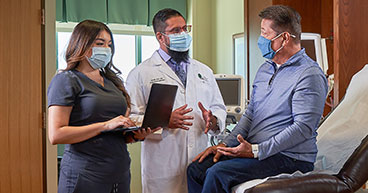
Hormone replacement therapy (HRT) is the medical equivalent of dinner-party conversations about politics and religion: a subject that draws opinions that are strong and divided—and is certain to evoke spirited debate.
Conflicting clinical data and discrepancies among studies have left the medical community with little to agree on, and many women wondering whether it’s safe to consider HRT to alleviate the often-difficult symptoms of menopause, such as hot flashes, fatigue, bone loss, vaginal dryness, painful intercourse and difficulty sleeping.
Linda Bosserman, MD, PhD, a medical oncologist at City of Hope®, has some answers. Dr. Bosserman, a breast cancer and value-based care specialist, has waded into the literature on HRT after completing her doctorate on the topic. She’s since drawn some conclusions—namely that natural hormone replacement therapies are safe and life promoting, while synthetic, or manmade, hormone drugs carry some risks.
In this article, we’ll explore:
If you’ve been diagnosed with cancer and are interested in a second opinion on your diagnosis and treatment plan, call us or chat online with a member of our team.
HRT for menopause
HRT works by replacing hormones lost during menopause. Traditional HRT includes estrogen and progesterone, which are hormones produced mostly by the ovaries and other organs.
Although treating the symptoms of menopause with estrogen alone is effective, it can increase the risk of endometrial cancer in women with a uterus, according to the American Cancer Society (ACS), which says estrogen therapy alone is only safe for women who don’t have a uterus (such as those who have had a hysterectomy).
For this reason, for women who have a uterus, HRT is given with a combination of estrogen and progesterone. The combination lowers the endometrial cancer risk back to a normal range.
HRT can be taken systemically, meaning it’s circulated throughout the bloodstream and to all parts of the body. (Examples include oral tablets, patches and gels.) Or it can be taken locally, meaning it’s only applied to a specific area of the body. (Examples include creams and vaginal rings.)
History of HRT
HRT as a form of therapy first gained traction in the 1960s as a way to control the often-unpleasant symptoms of menopause that last on average for seven years. Initially, the U.S. Food and Drug Administration (FDA) only approved HRT for symptom relief. Later, though, the American College of Physicians developed guidelines for using HRT not just for menopause symptoms, but as a preventive therapy for chronic conditions that affect postmenopausal women, such as heart disease, cancer and osteoporosis.
In 1990s, the Women’s Health Initiative (WHI) was established to launch a series of studies into the causes of heart disease, cancer and other health conditions in women, especially as they age past menopause. It also evaluated the effects of HRT on conditions affecting postmenopausal women. Unfortunately, the study only tested the synthetic hormones, conjugated equine estrogens (CEE) alone in women without a uterus or with medroxyprogesterone acetate (MPA), which is sold under the brand name Depo-Provera® for women with a uterus. The study was also done only in older women with a median age of 63 who had already spent over 10 years in menopause without hormone replacement.
The study was prematurely discontinued, however, after it found an increased incidence of breast cancer, heart disease, blood clots and stroke. At the time, experts thought the risks of HRT outweighed the benefits, and doctors stopped recommending it to all patients even those in early menopause who the study did not apply to.
Since then, further studies have found that natural HRT is highly beneficial in reducing death rates overall as well as those from heart disease and osteoporosis without causing an increase in breast cancer, ovarian cancer or other cancers—and the risks rare—when given to women soon after starting menopause or to women who are younger than 60 years old.
Is hormone replacement therapy safe?
Dr. Bosserman suggests that conflicting results from most United States-based research trials are due to not separating the trial results performed with synthetic hormone drugs—primarily CEE and MPA with those done with natural hormones, estradiol and micronized progesterone
“What is now clear,” she says, “is that natural hormone replacement with oral estradiol (a form of estrogen taken by mouth), micronized progesterone (a form of progesterone broken down into very fine particles) alone or with testosterone is safe, effective and lifesaving.”
In fact, oral estradiol is the strongest hormone to prevent blood vessels from developing the plaque that can cause blood blots, strokes and heart disease, Dr. Bosserman continues, noting that clinical trials confirm that natural HRT reduces overall causes of death by 40 percent and heart disease by 30 percent to 50 percent. In addition, it lowers the risk of dementia and helps maintain bone health, which may help to prevent deadly bone fractures, and reduces many menopause symptoms. HRT with natural hormone replacement and even in the CCE arm of the WHI reduces breast cancer risk by 29 percent over 20 years.
Pros and cons of HRT
The choice of whether to use HRT is personal and should be discussed with your doctor, Dr. Bosserman says.
“Each woman needs to look at her age, her priorities for her health and sexual function, her lipid profile and cardiovascular risks, bone health and brain function, and menopause issues,” she says. “But given the 40 percent reduction in all causes of death and the improvements in quality of life, women should be encouraged to use HRT at menopause.”
Benefits of hormone replacement therapy
Mihae Song, MD, a gynecologic oncologist at City of Hope National Cancer Center Duarte, says she typically recommends HRT for women:
- With gynecologic cancers, including ovarian cancer, cervical cancer and early-stage endometrial cancer
- Who carry a BRCA gene mutation but don’t have a personal history of breast cancer
- With Lynch syndrome, which is a hereditary condition that increases the risk of colon cancer
“The benefits of menopausal hormone therapy are greatest when started at menopause and during perimenopause, before the withdrawal of natural hormones begins the accelerated development of plaque in the lining of our arteries,” Dr. Bosserman says. “Once plaque develops, then synthetic hormones, which loosen plaque, can lead to early strokes, blood clots and heart attacks.”
Because natural estradiol with micronized progesterone doesn’t cause the risk of clotting, Dr. Bosserman says they’re the preferred therapies based on trials primarily performed in Europe and in a U.S. trial of a combination estradiol, micronized progesterone product. Because studies often use the terms estrogens and progestins to refer to both synthetic and natural hormone the differences in impacts on clotting and other risks are just now being recognized, she says.
In addition to not carrying risks, she adds, using natural forms of HRT comes with benefits including improved sexual function and bone health, and a lower risk of dementia.
Risks of hormone replacement therapy
Dr. Bosserman points out that risks vary and depend on several factors, including your age when you start taking HRT, how soon you begin taking it after starting menopause, and the type of therapy (such as synthetic versus bioidentical or estrogen-only versus estrogen-combined -with-progesterone).
“It is clear that vaginal estradiol, testosterone and DHEA, the precursor hormone to estradiol and testosterone, do not increase the risk of breast cancer recurrence or new breast cancers in long term studies representing over 50,000 women years of study,” she says. “Another 25 studies of giving women with breast cancer systemic estradiol and micronized progesterone or synthetic hormones have also shown no impact on breast cancer mortality.”
Those additional studies overall also showed no increased breast cancer recurrence risk except in one poorly done study without initial mammograms done, Dr. Bosserman says. Those studies, which also primarily used synthetic hormones are leading many breast cancer experts to support even the use of systemic natural hormone replacement in women with breast cancer after discussing it with patients as women’s main cause of death is cardiovascular which is improved with HRT.
“Many studies claim oral estrogens increase the risk of blood clots,” she says. “That is true for synthetic estrogens, especially when mixed with synthetic progestins, which I would not recommend.
“Sorting out the literature has been a time-consuming project but I have found no studies with oral, natural hormone replacement that have increased blood clot risks. Thus, women can choose oral estradiol or transdermal as they prefer but they need to understand the benefit of oral estradiol are greater on lipid profiles that impact blood vessel plaque.”
Ultimately, each HRT decision is personal, Dr. Bosserman says.
“As women approach menopause, they should have a detailed discussion with a doctor who has reviewed the latest information on the risks and benefits of natural hormone replacement,” Dr. Bosserman says. “They should understand their cardiovascular, bone and brain health risks as well as their menopausal symptoms and impacts on their sexual health and urinary functioning which can all benefit from HRT. There are now no data that stopping natural HRT or using the lowest doses for the shortest period of time to relieve menopausal symptoms is the best for women’s long term health benefits”
If you’ve been diagnosed with cancer and are interested in a second opinion on your diagnosis and treatment plan, call us or chat online with a member of our team.



